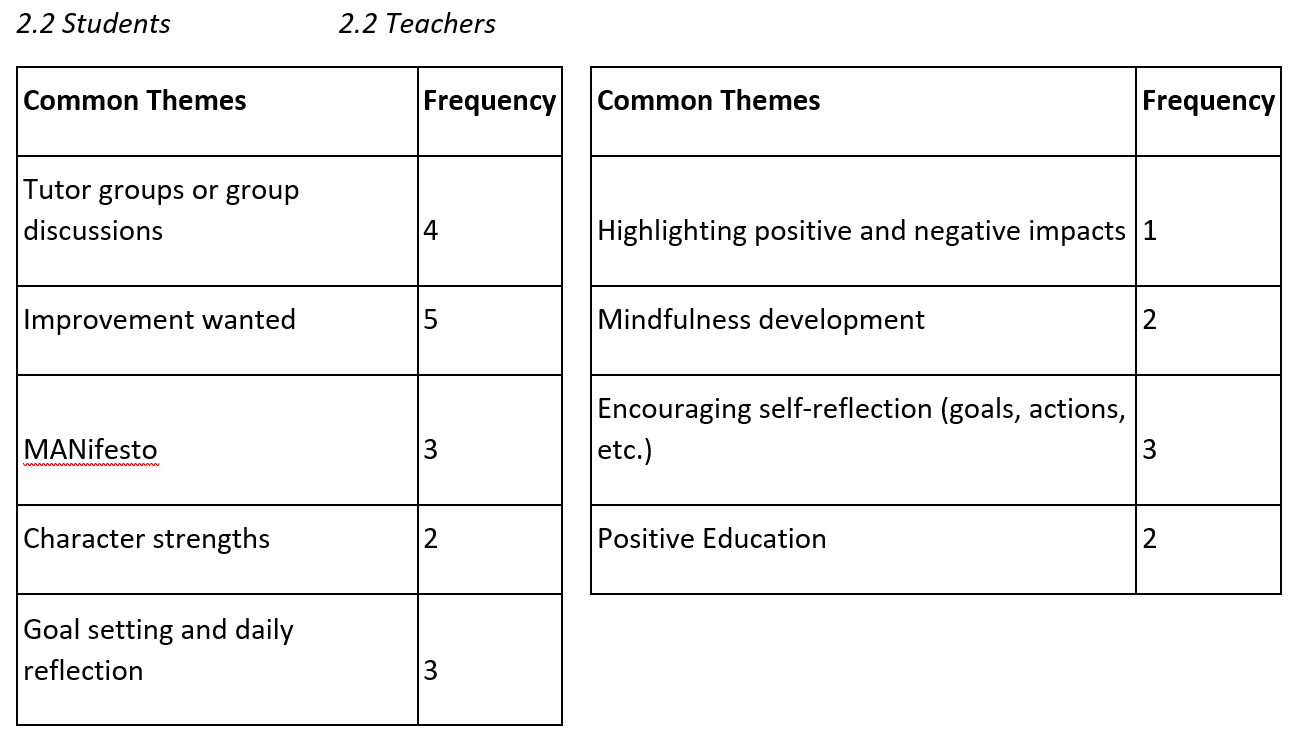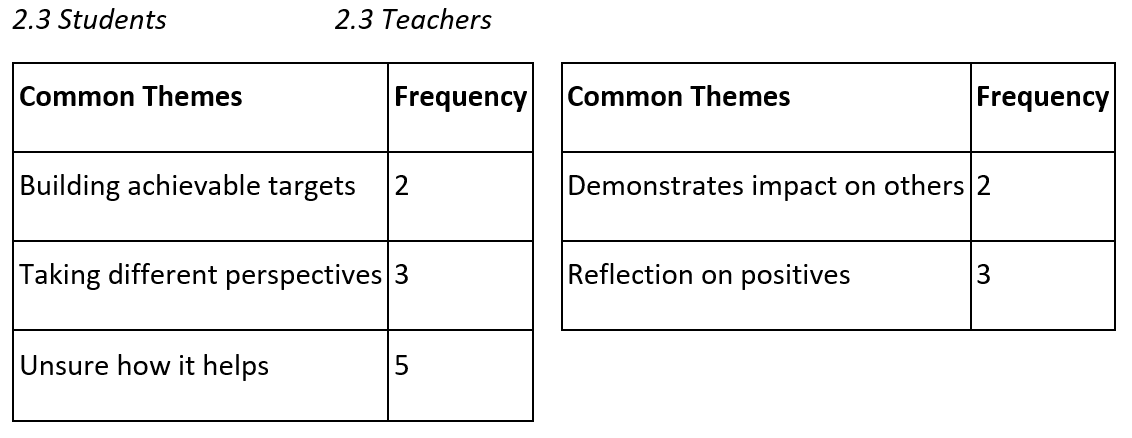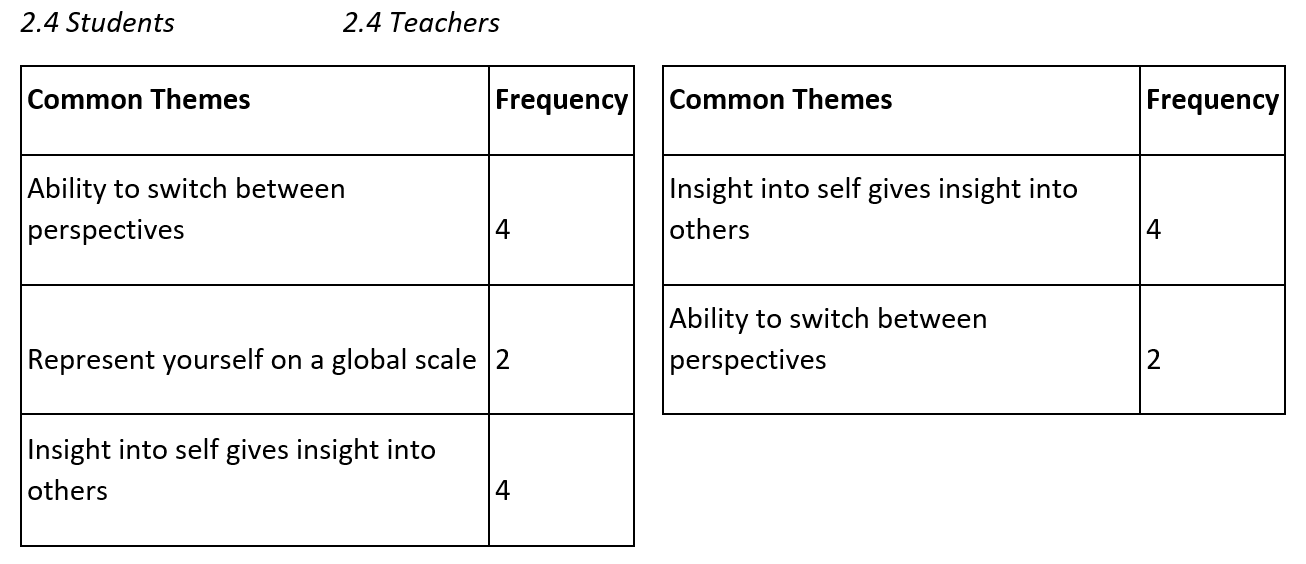Developing International Understanding with Self-awareness
Authored by: Junie Wee and Angad Vraich from Christ’s College, Christchurch, New Zealand
Summary
This paper examines why developing self-awareness is important for students aged 15 to 18 growing up in a globalised world, and the ways in which our school supports this development. Surveys and interviews were conducted with students and teachers, questioning them about the activities they are offered or involved in, how these activities develop their self awareness, and the extent to which these activities affect their international understanding. Qualitative research methods were used to explore this question, analyse the data and present the findings, which shows that developing self-awareness has a significant impact on improving international understanding because one’s insight into self gives insight into others, which by extension, improves the ability to switch between perspectives.
Introduction
We believe being self-aware is critical to developing international understanding. The ability to work effectively with people across all cultures is fostered by being self-aware, especially with regard to cultural identity and views on or perceptions about differences. Furthermore, self-awareness can be used as a tool to cultivate mutual acceptance and understanding and, as our results show, this may assist in the development of international understanding.
Most boys were eager to develop self-awareness, but a lack of opportunities has hindered them from doing so. We believe developing self-awareness has not been given enough importance but is taken for granted. One student recalled, “There really is no focus on getting young children and teens to become self-aware”.
Process
The research participants were 15 to 18-year-old students. Five students were surveyed, and three additional students were interviewed. Four teachers were surveyed, and three of these teachers were interviewed.
The following questions were asked:
- What is self-awareness?
- What is College doing to improve your self-awareness?
- How and why does this help develop your self-awareness?
- How does developing self-awareness help develop your international understanding or global competency?
Analysis
Qualitative analysis of the responses to the four questions uncovered several common themes. Frequently occurring responses are described below. See the appendices for other themes.
What is self awareness?
The most frequently-occurring theme for students was being aware of their character strengths, knowing who they are and what they stand for. Whereas for teachers, it was being conscious of their environment, acknowledging how “different situations are affecting you and knowing when to adjust your responses accordingly”. But, most importantly, it is “having an idea about where and how you fit into your surroundings”, which is possible through the understanding of cultural identity and identifying the similarities and differences present in the environment.
What is College doing to improve your self-awareness?
The most frequent students’ response was the desire to improve their self-awareness: “I don’t think there is large emphasis on self-awareness”, which suggests more opportunities are needed. Some students believe tutor groups and MANifesto programme are helpful. Tutor group is a discussion/goal-planning group, which is made up of one teacher and around ten students. MANifesto is a health and wellbeing programme for senior (Years 12 and 13) students, designed to get them thinking about some of the issues young men face and how they can deal with them.
For teachers, encouraging self-reflection (on goals and actions) is a key way to improve students’ self-awareness. This is usually done in classes, tutor groups, or House meetings. Another notable way is the introduction of a Positive Education programme, which “gives students tools with which to get to know themselves”. Positive Education draws on positive psychology’s emphasis of an individual’s character strengths and personal motivation to promote learning.
How and why does this help develop your self-awareness?
Through discussions in tutor group sessions, students are able to let their thoughts wander, which helps them build awareness in certain areas of which they were previously unaware, and take note of their strengths and weaknesses, their beliefs and values. Also, group discussions within tutor groups allow students to “see other people’s worldviews [and] to expand on how [they] see [themselves]”, thus improve their self-awareness about their cultural identity, and the conflicting views that exist within their community. The tutor group sessions are the most popular approach taken by teachers, as they believe it allows time for reflection to occur, and for students to “think about their impact on those around them, which teaches them self-control”.
Nevertheless, five out of eight students surveyed were somewhat uncertain about how the activities mentioned by students in 2.2 help them develop self-awareness. This may suggest the current ways are ineffective, and new ways must be developed. The recent introduction of a Positive Education programme seems to be highly effective, as the teachers’ responses show. The Positive Education programme promotes character strengths (understanding their character strengths and how they can use them daily), fostering a growth mindset (having the will and courage to try new things, embracing failure and reinforcing the process, not the outcome, thus discovering more about themselves), and developing mindfulness (focusing on the moment and being able to express compassion and gratitude, which leads students to “focus on the impact others have on them and their impact on others”). Therefore, they become more aware of their own actions in their surroundings.
How does developing self-awareness help develop your international understanding or global competency?
Both students and teachers agree that improving self-awareness brings valuable insight and understanding of other people. This means knowing more about yourself, leads you to become more secure and comfortable with your views, cultural identity, and place in the world which, as stated by participating students, fosters “curiosity and willingness to discover the world outside [their] current experience”. This, in conjunction with adopting a growth mindset via positive education, enables students to break from insularity, and be open to people from other cultures. Thus fostering mutual understanding and the ability to embrace diversity.
Increased self-awareness also improves the ability to understand others and switch between perspectives. As one student participant reported, “Since I know about myself, I can draw similarities between what I am doing (influenced by my culture) and what others are doing (influenced by their culture)”. Most students believed being more self-aware allowed them to “see if [they] are being opinionated and insular” by putting themselves in another person’s shoes. This fosters greater mutual understanding and acceptance.
Conclusion
This study examined the extent to which self-awareness development sessions and activities affect students’ international understanding. The development of self-awareness has a direct positive impact on students’ international understanding, which is crucial in today’s interconnected world where students must learn to navigate and engage with a society that is composed of many nationalities and cultures. The students and teachers alike agree developing self-awareness can help foster greater international understanding as it develops the ability to look beyond oneself. However, there are a variety of factors that hinders the development of self-awareness, and by extension their international understanding.
The main cause that impedes a greater development of students’ self-awareness is the lack of effective methods that schools adopt to aid their students. Further, schools should seek to increase students’ access to opportunities that develop their understanding of self-awareness, as well as more exposure to different ideas that challenge what students regard as their normal. In addition, the students should be given a clearer aim of each sessions/activities before they commence.
If schools fail to address these issues, then many students may find difficult to work effectively with people across all cultures. This is because self-awareness, especially with regard to cultural identity and views on or perceptions about differences, allows students to become more confident with who they are and the values they represent, and thereby they become more curious, appreciative, and understanding of the world outside their own current experience. This may be because they now feel less threatened by diversity, with which they are not used to, and therefore are able to identify differences between themselves and others, without elevating themselves by putting down someone else’s culture, dignity and self-worth. Hence this fosters mutual acceptance and understanding that assist the development of international understanding.
One of the key character attributes of the ideal Christ’s College graduate is global and bi-cultural competence. With the right programmes in place to engage student interest and participation, a greater sense of self-awareness will go a long way to help College students achieve this goal.
Appendices




